- Home
- Franklin Horton
Random Acts
Random Acts Read online
Copyright © 2018 by Franklin Horton
Cover by Deranged Doctor Design
Editing by Felicia Sullivan
All rights reserved.
No part of this book may be reproduced in any form or by any electronic or mechanical means, including information storage and retrieval systems, without written permission from the author, except for the use of brief quotations in a book review.
Created with Vellum
Contents
Chapter 1
Chapter 2
Chapter 3
Chapter 4
Chapter 5
Chapter 6
Chapter 7
Chapter 8
Chapter 9
Chapter 10
Chapter 11
Chapter 12
Chapter 13
Chapter 14
Chapter 15
Chapter 16
Chapter 17
Chapter 18
Chapter 19
Chapter 20
Chapter 21
Chapter 22
Chapter 23
Chapter 24
Chapter 25
Chapter 26
Chapter 27
Chapter 28
Chapter 29
Chapter 30
Chapter 31
Chapter 32
Chapter 33
Chapter 34
Chapter 35
Chapter 36
Chapter 37
Chapter 38
Chapter 39
Chapter 40
Chapter 41
Chapter 42
Chapter 43
Chapter 44
Chapter 45
Chapter 46
Chapter 47
Chapter 48
Chapter 49
Chapter 50
Chapter 51
Chapter 52
Chapter 53
Chapter 54
Chapter 55
Chapter 56
Chapter 57
Chapter 58
Chapter 59
Chapter 60
About the Author
Also by Franklin Horton
A Sample of The Borrowed World
Bonus Content
1
The thick hood over his head prevented Mohammed Karwan from seeing anything, but the dank smell reaching his nose convinced him he was standing on the earthen floor of one of Frankfurt’s ancient buildings. He suspected his two other roommates were there with him but when he tried to ask in the back of the van he had been struck in the head with a fist. Although not an injurious blow, it was substantial enough to clarify that conversation would not be tolerated. He would have to wait as patiently as a hooded man could wait to see what fate lay ahead of them.
Mohammed and his roommates each received a text message several hours ago asking them to be at their flat by eight P.M. Fifteen minutes after the appointed time, a man they did not know arrived at the flat and instructed them to be at the mosque in thirty minutes. There was no confusion as to which mosque. There was only one mosque to which they were ever summoned.
"Do you think something is wrong?" Machmud asked. He was the most high-strung and nervous of the roommates, always concerned that he was in peril. Perhaps he was not cut out for this business of theirs, but that was irrelevant. This was their life. This was where they found themselves.
Mohammed, the senior of the men, shook his head at Machmud’s question. "I don't know, my brother. I assume we will find out in due time." He was the stoic one, his fatalistic attitude the result of a life filled with brutality and violence.
Machmud did not speak again. The men filed onto the street and loaded into the used Renault Megane they shared when a vehicle was required. When they reach the mosque, they parked in an alley and entered through a side door. They were met by four men who gestured for them to turn around and face away from them. These were strong, menacing men dressed as laborers. They were not men to be argued with.
The laborers placed a hood roughly over each man’s head. Mohammed was startled.
Machmud tried to twist away and face the laborers. “But why?”
The man attempting to place the hood on Machmud’s head twisted his mouth in anger. He let loose with a powerful jab that sent Machmud staggering into the wall. The man twisted Machmud’s stunned body and shoved him face-first into the wall.
“That was not a request,” he growled.
The man made another attempt with the hood and this time Machmud did not protest. Mohammed was grabbed roughly from behind, his wrists clamped together by a strong hand before being bound with flex-cuffs. From the ratcheting sounds surrounding him, he could tell the other roommates were being cuffed also. Mohammed knew he’d done nothing wrong, but he still found the circumstances to be terrifying. He was also painfully aware that innocence was no guarantee he would return home this night. People in his line of work disappeared all the time and no one ever asked questions.
They were marched out the back door and shoved into the rear compartment of a windowless work van. Mohammed heard Machmud protest again. It was followed by the dull thud of a physical reprimand and the accompanying cry of pain.
Mohammed apparently failed to learn from Machmud’s treatment. “Is everyone okay?” he asked. “Are you all here?”
He was rewarded with a blow to the head that rattled his brain and made his eyes water.
Mohammed chose to remain silent from that point and focus on the right and left turns. He was familiar enough with this area that, for a while, he was able to keep track of their direction of travel. It became clear the driver was attempting to confuse them, and he eventually succeeded.
The drove aimlessly for hours before Mohammed found himself standing on the packed dirt floor somewhere in the city. He assumed the location to be an abandoned factory or warehouse. The city was full of them. All he could tell with his senses muted by the hood and the noise of the van was they’d entered through a pair of rolling doors and parked inside the structure. When the engine was turned off, the van doors were opened and they were shoved out into a heap.
When the hoods were yanked from their heads, the roommates found themselves staring at six robed men seated in folding chairs. Propane lanterns were scattered around the room, providing a bright yellowish light that created long shadows and did nothing to reduce the grave appearance of the seated men. Mohammed recognized two of them. One was their handler, the man who came to the roommates for progress reports and updates. He was the man who brought them their instructions, the man he assumed carried news of their progress–or lack of it–to the leaders of their organization. If he were a betting man, Mohammed would assume these unfamiliar men in front of him were part of that senior leadership, fellow Syrians from back home.
The other man he recognized was the Imam, the prayer leader from the local mosque. Dressed in traditional robes and with a long gray beard, the Imam kept his hands folded in his lap, his eyes moving between the faces of the roommates. To the side of the seated men was a crude wooden table. A cast iron kettle sat atop a small stove, flames spilling out around it as the kettle heated. Mohammed did not expect they were going to offer him a cup of tea.
A man Mohammed had not met before addressed him. "Do you know who I am?"
Mohammed nodded, a slight bow of deferral. “We have not met, but I think I recognize you.” He thought the man was a leader within his organization. Perhaps a man named Miran.
"Do you know why I am here?" Miran asked.
Mohammed shook his head.
Miran stood. He appeared to be in his forties, beginning to gray but still dangerously strong. He moved like a soldier, efficient and powerful. He walked to the wooden table and lifted the wire bail from the lid of the kettle, peering inside.
He appeared to be satisfied with what he found as it brought a slight smile to his face. He looked from the kettle to Mohammed.
"Did you know an apartment with four of our brothers was raided yesterday?"
Mohammed nodded. "I saw the story on the news.”
Miran left the table and stood directly in front of him. Mohammed didn’t feel as if he’d done anything wrong but this man made him question that. This was a man who would not hesitate to kill someone who had failed him.
"Their arrest makes you our most senior group in the field. That’s unfortunate for us because you've not produced any fruitful results. It’s unfortunate for you since the pressure of a successful mission now lays upon your shoulders."
Mohammed did not know how to respond.
“We do not have the deep pockets some organizations have,” Miran said. “We cannot support people living in expensive city apartments and not producing results. Many men work hard to allow you to live this life in the city, to allow you to work with computers instead of stone and concrete.”
“We are working hard too,” Mohammed said. “Work is all we do. Exactly as we were instructed. As we were trained.”
Miran tilted his shoulders in a gesture that indicated he thought the sincerity of the statement was questionable. He gave Mohammed a disbelieving look. “Well, I think not all of you work as you should.”
“We do,” Mohammed assured him.
“Are you willing to stake our life on that?” Miran asked.
Mohammed looked down. “I assume it to be so. I do not look over every shoulder.”
“Wise decision, not staking your life on it,” Miran said. “Your fellow man will disappoint you as often as he will impress you.”
A pop from the kettle drew everyone's attention. Miran smiled at Mohammed and rubbed his hands together. "Ah, it’s ready. Finally."
Miran went back to the table, peering into the top of the kettle again. He reached into a pocket of his robe and drew out a potato. From a sheath on his belt he drew a traditional dagger, its point curved and wicked. He placed the potato on the table and cut it into slices. All eyes were on him, some curious, some terrified.
Miran stabbed the tip of the dagger into one round slice of the potato and dropped it into the kettle. There was a hiss and pop.
“Oil,” he explained. “If you thought I invited you over for tea, you are to be sadly disappointed.”
Miran walked back around the table and faced the three roommates. “Which of you is Machmud?”
“Why do you ask! I’ve done nothing!” Machmud burst out.
Mohammed turned and regarded his roommate. Why was the man so agitated?
Miran approached Machmud and smiled broadly. “Why are you so upset, my brother?”
“I feel like I’m being accused,” Machmud sputtered. “I’ve done nothing.”
“Perhaps that feeling is the jagged edge of your guilt sawing against your guts?” Miran said, leaning close to Machmud. “Perhaps your body betrays what the mind tries to cover up?”
Miran walked back to the table and used the blade of his dagger to fish the potato slice from the oil. It was browned to a crisp. Miran looked past the roommates to the silent row of laborers who’d delivered them here.
“Bring him to me.”
There was no hesitation on their part. Instantly, a man was at each side and they dragged Machmud forward. He protested and kicked at the men. This was not well-received. One laborer stomped his heavy steel-toed boot sadistically across Machmud’s calf, forcing a scream from the man.
“I’ve done nothing!” Machmud sobbed.
Miran ignored the protests. He walked around the table. “Stand him up!” he ordered.
The men pulled Machmud to his feet but his injured leg would not support his weight. He was weaving and leaning onto his captors.
“Where were you when you received our text message tonight?” Miran asked. “Where were you when we asked you to return to the apartment?”
“I was with a contact,” Machmud said urgently. He was sweating profusely and tears cut paths through the dust caked on his face. “I was cultivating a relationship.”
“What type of relationship?” Miran persisted.
“A contact. That’s all.”
Miran grabbed Machmud by the hair and raised the dagger to his throat. “Do you think we are so stupid as to turn you loose with no way to monitor you? Did you not realize you were always on a virtual leash? That we tracked all your movements both in the city and on the internet? That we know every website you go to and every message you send?”
Machmud’s panic rose another notch and he tried to protest. “I’ve…done…nothing…wrong.”
“Your job was to make inroads we could exploit. Your goal was to cultivate relationships and nurture those relationships into assets we could manipulate. Instead, all you’ve done is pursue your own deviant pleasure." Miran drew the word deviant out, relishing the way it sounded on his tongue.
"I did nothing."
“Do I need to read the transcripts out loud?" Miran yelled, getting in Machmud’s face. “Do you I need to read the messages aloud? Do I need to show the pictures you exchanged?”
Machmud sobbed and went limp. The men supporting him allowed him to drop to the ground. His hands still flex-cuffed, he curled up and sobbed. "I am sorry. She tempted me and I could not resist."
"Did she tell you things you liked to hear?" Miran mocked. “Was she a temptress?”
Machmud moaned. "Yes. Yes!"
“Then we will make certain you do not hear things that tempt you again," Miran spat. "Hold him down!”
The men at Machmud’s side slid on thick leather welding gloves which they used hold Machmud down. One of them, a thick man with arms like tree trunks, placed one on Machmud’s neck and another on his forehead, crushing his cheek into the dirt floor. Miran went to the kettle of boiling oil and returned with it. He crouched over Machmud’s ear.
Machmud whimpered and cried, still not completely certain what was about to take place. He could not see what Mohammed saw. He struggled but he could not gain ground against the strong arms holding him. Miran tipped the kettle to Machmud’s ear.
Machmud screamed. He kicked and fought like an animal, but Miran continued pouring until the ear was full.
"Flip him over,” Miran ordered.
The gloved men did as they were told. As they rolled him over, Mohammed could see Machmud’s eyes wide with pain, shock, and terror. He tried to scream again but no scream could release the explosion of pain inside his head.
Once rolled to his other side Miran leaned over Machmud and whispered into his ear. "Remember my voice. It is the last you'll ever hear."
Then he poured the other ear full of the burning oil, deep frying everything within the canal. Miran returned to the table and placed the kettle beside the burner. "Take him away!"
The gloved men grabbed Machmud by his arms and dragged him away into the darkness. Mohammed wondered what would become of him. Would they kill him? Would they return him home? When Mohammed returned his eyes from Machmud to Miran he found the man staring at him.
"Have I made myself clear?" Miran asked. "Are you aware now of how serious and how urgent our mission is?"
"We understand," Mohammed replied.
"I will return in two weeks. You have that long to develop an actionable plan. Should you have nothing for me, what you saw tonight will look like the easy way out."
“We will not disappoint you,” Mohammed said.
Miran’s look indicated he was not convinced. "Get them out of here," he hissed.
The hood was thrown back over Mohammed's head and he was shoved from the room. He felt a sickness deep inside that made him want to throw up, though to do so with the hood on his head would only increase his suffering. He had not known Machmud well and had not known of his activities on the computer.
He also had not known they were being monitored so closely. That concerned him. There were times he wa
tched a stupid video to blow off steam and relax. One thing was certain; he would type each word now with the understanding that he might one day have to stand before Miran and explain it. He would type each word with the understanding his life may one day depend on it.
2
Amanda Castle burst through the heavy double doors of the funeral home and stood on the sidewalk, sucking in air and trying to get her emotions under control. She was losing the battle. Tears burned their way from her eyes and her chest was heaving. She didn’t feel like she was getting enough air. She was a hair's breadth from completely losing it. She looked desperately around the parking lot for a refuge, for some place where people weren’t staring at her.
The door opened behind her and in a moment she felt a reassuring arm wrap around her. She knew it was her dad from the strength in the arm.
"I'm sorry, Amanda, honey."
Part of Amanda wanted to wrap her arms around her dad but was aware that would not help her regain control of her emotions. Back in her dad's arms, she would feel like a child again and probably start acting like one. In seconds she'd be reduced to a sobbing mess, clutching at him like a kid who'd fallen off a bicycle. She was seventeen years old, practically an adult, and felt on some level like she should be handling this better, but she wasn’t.

 Child With No Name
Child With No Name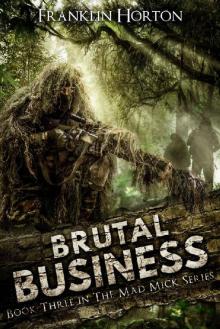 Brutal Business: Book Three in the Mad Mick Series
Brutal Business: Book Three in the Mad Mick Series Northern Sun: Book Four in The Mad Mick Series
Northern Sun: Book Four in The Mad Mick Series Hard Trauma
Hard Trauma The Mad Mick: Book One of The Mad Mick Series
The Mad Mick: Book One of The Mad Mick Series The Ungovernable
The Ungovernable Blood Bought: Book Four in The Locker Nine Series
Blood Bought: Book Four in The Locker Nine Series Compound Fracture
Compound Fracture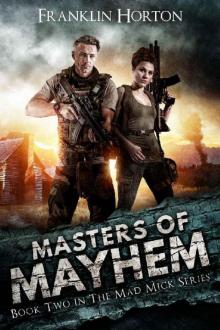 Masters of Mayhem
Masters of Mayhem Ultraviolent: Book Six in The Mad Mick Series
Ultraviolent: Book Six in The Mad Mick Series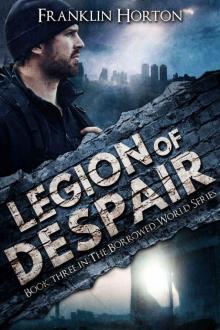 The Borrowed World (Book 3): Legion of Despair
The Borrowed World (Book 3): Legion of Despair Grace Under Fire: Book Two In The Locker Nine Series
Grace Under Fire: Book Two In The Locker Nine Series Punching Tickets: Book Five in The Mad Mick Series
Punching Tickets: Book Five in The Mad Mick Series Switched On: Book Six in The Borrowed World Series
Switched On: Book Six in The Borrowed World Series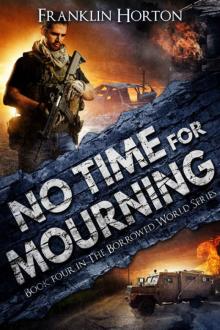 No Time For Mourning: Book Four in The Borrowed World Series
No Time For Mourning: Book Four in The Borrowed World Series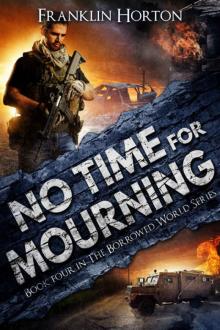 The Borrowed World (Book 4): No Time For Mourning
The Borrowed World (Book 4): No Time For Mourning Random Acts
Random Acts The Borrowed World: A Novel of Post-Apocalyptic Collapse
The Borrowed World: A Novel of Post-Apocalyptic Collapse Switched On
Switched On Grace Under Fire
Grace Under Fire Valley of Vengeance: Book Five in The Borrowed World Series
Valley of Vengeance: Book Five in The Borrowed World Series